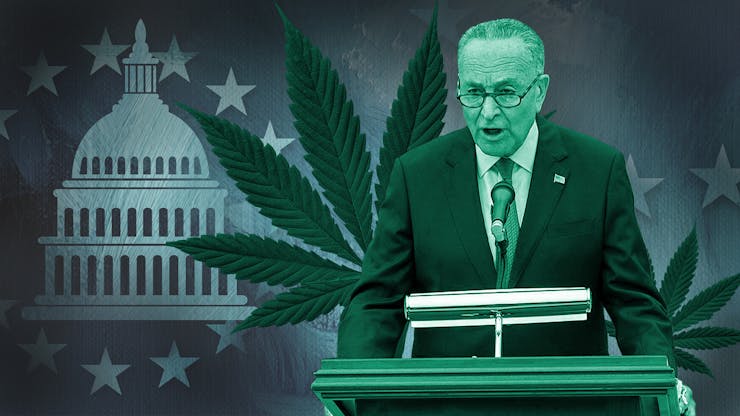After months of speculation, US Senate Majority Leader Chuck Schumer revealed his long-awaited marijuana legalization bill this morning. The measure closely resembles the MORE Act, which passed the House last year but failed to find traction in the Senate.
The bill would remove cannabis from the federal list of controlled substances, expunge federal cannabis records, impose a federal tax on marijuana, and reinvest that tax revenue in communities and individuals most adversely affected by the War on Drugs.
The new bill, known as the Cannabis Administration and Opportunity Act, was officially introduced by Sen. Cory Booker (D-NJ), and co-sponsored by Schumer and Sen. Ron Wyden (D-OR). Politico posted the first publicly available version of the bill earlier this morning.
What’s new: Emphasis on equity
The new bill does differ from many previous recent legalization efforts in Congress in one significant way. It puts the inequality in today’s state-legal cannabis industry right up front.
“The communities that have been most harmed by cannabis prohibition are benefitting the least from the legal marijuana marketplace,” the bill states. “A legacy of racial and ethnic injustices, compounded by disproportionate collateral consequences of 80 years of cannabis prohibition enforcement, now limits participation in the industry.”
That’s how the bill opens—before federal legalization is even mentioned.
Leafly recently documented the factors involved in the cannabis industry’s diversity problem, and ways to address it, in the report Seeds of Change: Strategies to create an equitable cannabis industry.
‘SAFE Banking’ no longer good enough
At a press conference announcing the bill this afternoon in Washington, DC, bill co-sponsor Cory Booker made it clear that federal legalization, with equity, would take precedence over previous partial efforts like the SAFE Banking Act.
Shop highly rated dispensaries near you
Showing you dispensaries nearThat banking measure, which did not pass in either chamber of Congress, would have allowed financial institutions to serve state-legal cannabis companies without fear of federal penalties. It would have provided relief to existing businesses without offering relief to the 500,000 Americans arrested for cannabis every year.
Booker said he would actively block the banking act because it does not offer any criminal justice relief or equity measures.
Reinvestment measures included
The bill would create a Community Reinvestment Grant Program aimed at reinvesting cannabis tax revenue in communities most hurt by the War on Drugs.
Grants would be available to nonprofit organizations involved in job training, reentry services, expungement legal aid, literacy programs, youth recreation or mentoring, or health education programs.
The bill would also direct the federal Small Business Administration to create a Cannabis Opportunity Program. The program would offer federally-backed Section 7(m) small business loans to cannabis companies owned and controlled by socially and economically disadvantaged individuals.
Early criticism
Drug policy reform advocates widely hailed the introduction of the bill, noting the historical significance of the Senate Majority Leader leading the charge to end prohibition.
The new bill isn’t perfect, though, and a number of policy advocates quickly noted that Schumer’s bill would continue to subject federal employees to cannabis drug testing, and not extend cannabis record expungement to all impacted individuals.
Maritza Perez, director of national affairs for the Drug Policy Alliance, pointed out one issue her organization will be working to amend. The Senate proposal “contains exclusionary language,” she said, that would deny expungement to “certain individuals—who have already paid the highest price—the opportunity to expunge their records.”
Perez referred to the so-called “kingpin” exclusion, which was added to the MORE Act last year and is included in Schumer’s new bill. Both measures would expunge federal cannabis records within one year of the bill’s passage. But individuals who received enhanced sentences for past cannabis crimes would not be eligible for expungement.
Where are the Republicans?
Significantly, the bill had no Republican co-sponsors upon introduction.
That’s a big deal, because Booker, Schumer, and Wyden will likely need at least a few votes from across the aisle in order to pass the measure. Democrats are more likely to support legalization than Republicans, but it’s not a strictly partisan issue. Support breaks strongly along generational lines, and a number of elderly Democratic senators—even from states that have already legalized—have long balked at the idea of ending prohibition.
Meanwhile, the vast majority of Americans have moved on from that old mindset. The most recent Gallup poll (Nov. 2020) put national support for marijuana legalization at 68%.
President Joe Biden, until recently a senator in his mid-seventies, can barely bring himself to embrace cannabis decriminalization, not legalization. Decrim, and not the kind of legalization contained in the new Senate bill, remains his official position.
The MORE Act’s passage in the House last year was helped by a number of Republican members, including members of the House’s bipartisan Cannabis Caucus. The Senate has no equivalent Cannabis Caucus.
What the bill actually does
Here are the major actions enabled by the Cannabis Administration and Opportunity Act.
Federal descheduling and regulation
The new bill would:
- Remove cannabis from the federal schedule of controlled substances
- Take the DEA out of the cannabis law enforcement business
- Install the Treasury Department; the Bureau of Alcohol, Tobacco, Firearms and Explosives (ATF); and the Department of Health and Human Services as the agencies regulating the enforcement of federal cannabis laws
- Prevent federal officials from discriminating anyone who uses cannabis legally
Restorative justice programs
The new bill would:
- Create an Opportunity Trust Fund within the Justice Department’s Office of Justice Programs
- Create a Cannabis Opportunity Program within the Small Business Administration, which would offer Section 7(m) small business loans to cannabis companies owned by equity-eligible individuals
- Create an Equitable Licensing Grant Program, overseen by the Small Business Administration, to fund state or municipal efforts to develop equitable cannabis licensing programs for individuals adversely affected by the War on Drugs
New federal cannabis tax
The new bill would:
- Create a new federal cannabis tax, starting at 10% for the first two years of legalization, and gradually rising to 25%. This would be in addition to any existing state and local taxes.
Defining who’s been harmed by the War on Drugs
The new bill also sets a standard for individuals eligible for federal cannabis equity opportunities. Those individuals would need to meet one of the two criteria set out below.
- Anyone who has had an income below 250% of the federal poverty level for at least 5 of the past 10 years and has been arrested for the possession, or use, or manufacture, or cultivation of cannabis
- Anyone who is the parent, sibling, spouse, or child of a person arrested in the manner described above
More to come
Leafly’s news staff will continue to update this article with new information about the Cannabis Administration and Opportunity Act throughout the day.





